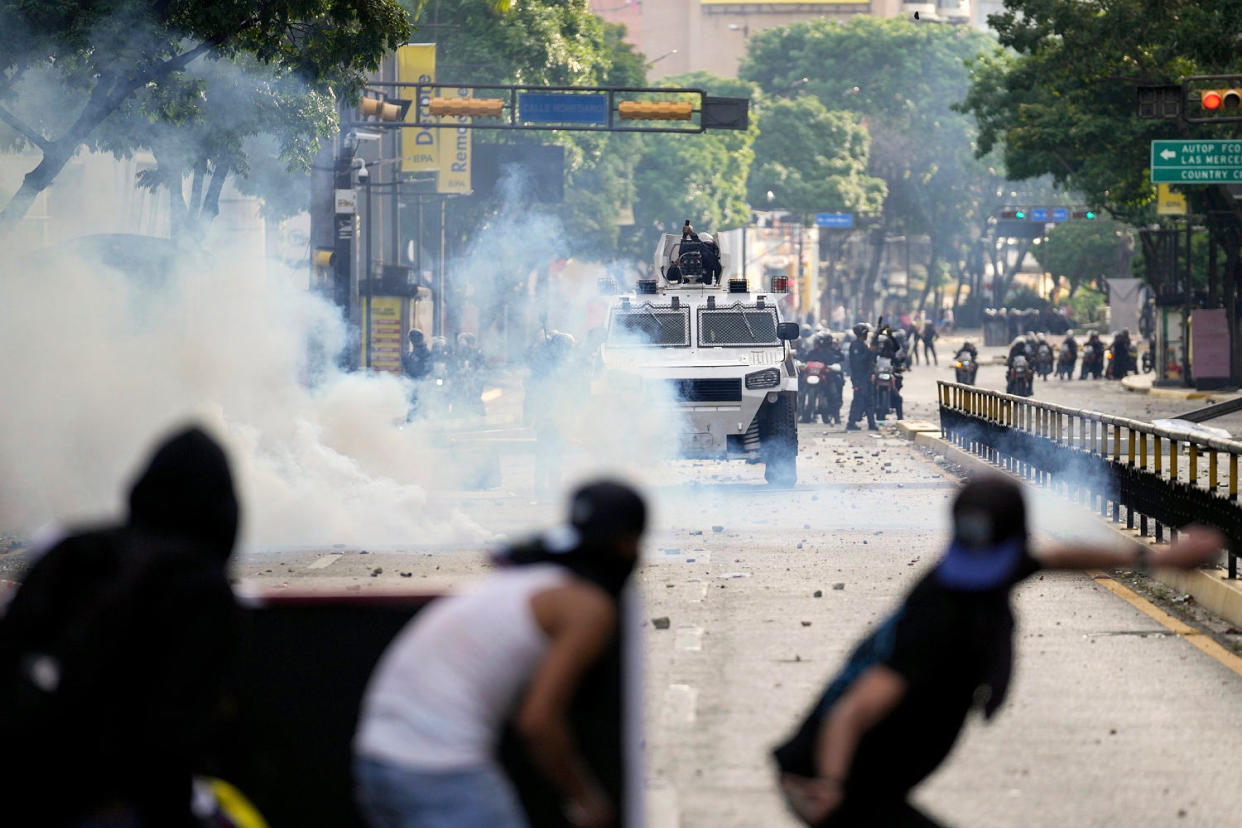Venezuela's election crisis shows limits of U.S. administrations over the roots of migration

In the upcoming presidential debate, former President Donald Trump will likely reiterate claims that Vice President Kamala Harris is a failed border czar, to which she will most probably counterpunch by saying that Trump blocked a crucial bipartisan border security deal in Congress.
But 48 hours before that showdown, the immigration landscape has been reset. The U.S.-recognized winner of Venezuela’s presidential election on July 28, Edmundo González Urrutia, fled to Spain as President Nicolás Maduro heightened his repression campaign and issued a warrant for his arrest.
These two events, nearly juxtaposed, serve as a reality check for American voters on the limitations the U.S. administration, regardless of party, face in the Latin American countries that are home to the hundreds of thousands of migrants that cross the border every year.
There are limits to the U.S.'s leverage when it comes to the political dynamics of a country or region, said Francisco Rodriguez, professor at the Josef Korbel School of International Studies in Denver, Colorado. Cuba is one example, he said.
“Once authoritarian regimes get entrenched, it is difficult to change them and external pressure doesn’t necessarily do the trick,” Rodriguez said.
As of June, more than 7.8 million Venezuelans were living outside their country, mostly in other Latin American countries, according to the Office of the Special Envoy for the Regional Response to the Venezuela Situation.
Before the disputed elections in Venezuela, over 40% of Venezuelans surveyed said they would consider leaving the country if Maduro remained in power.
Since the George W. Bush administration, the U.S. and other countries have imposed sanctions on individuals in power in Venezuela and their family members.
As human rights abuses and the dismantling of democratic institutions intensified under Maduro, President Donald Trump followed with “maximum pressure” sanctions in an attempt to squeeze him out of office.
But Maduro endured and the economic and humanitarian crisis in Venezuela worsened. As a result, the U.S. has seen an increasing number of Venezuelans show up on its borders.
President Joe Biden eased some of the crippling sanctions imposed by Trump, allowing Chevron, and later other companies, to operate in Venezuela in an attempt to support talks between the opposition and Maduro. But Maduro failed to comply with an agreement to move toward fair elections, and just six months later the administration reinstated the oil ban to some of the companies. Chevron still is allowed to operate in the country.
A Venezuela election body stacked with Maduro backers has declared Maduro the winner of the country’s July 28 election but refused to release vote tallies. Opposition leaders say partial tallies show González won 70% of the vote.
Other Latin American and European countries have joined the U.S. in not recognizing Maduro’s election “victory.” The U.S. has recognized González as the winner, but not as president-elect.
The questionable election results have resulted in deadly demonstrations attributed to the heavy-handed response from Maduro’s forces.
'Few options' and 'no fast fix'
In an article for “Emissary,” a publication of the Carnegie Endowment for International Peace, Oliver Stunkel, a visiting scholar at Carnegie, wrote that the “limited influence” of the coalition of the U.S. and European and Latin American countries refusing to recognize Maduro’s election results “leaves it with few options.”
“The appetite for a renewed pressure campaign involving sanctions against Venezuela is slim,” he said, largely because previous sanctions worsened the country’s economy and did not remove Maduro.
“In addition, many in this group, particularly the United States, are concerned that broader sanctions could increase emigration,” Stunkel wrote.
As vice president, Harris was tasked with addressing the “root causes” of migration, specifically from the Northern Triangle countries of El Salvador, Guatemala and Honduras. That role did not include direct involvement in migration and enforcement at the U.S.-Mexico border.
Her job was to focus on bolstering investment in business and other sectors in those countries, to improve the living conditions pushing people out. There is disagreement on how well she performed that task.
Jason Marczak, an Atlantic Council Latin America expert, wrote that soon after Harris took on the border job, it became clear “there would be no fast fix” to the “decades of insecurity, economic challenges, and weak governance, among other factors” that confront the region.
The number of Venezuelans encountered at the southwestern U.S. border this fiscal year looks likely to surpass the previous fiscal year total of 266,071.
As of July, this fiscal year’s total was 230,582. The 2024 fiscal year began Oct. 1, 2023 and ends Sept. 31, 2024. Customs and Border Protection totals for August have not yet been posted. But, since March, monthly totals have been lower this fiscal year compared to the same month a year earlier. For example, the number of Venezuelans encountered in April this fiscal year was 18,371, compared to 32,733 in April of 2023.
Biden resumed deportations of Venezuelans as a condition of the election negotiations with Maduro. But Maduro stopped repatriation flights from the U.S. in February when Biden reimposed sanctions. Venezuelans are now indirectly returned via Mexico. Biden also has set up a program for Venezuelans and others to apply for legal entry to the U.S. and granted temporary protected status to some.
Trump also granted protection from deportation to Venezuelans during his administration.
Trump had previously criticized Biden’s easing of oil sanctions and is likely to have similar condemnation for Harris in the debate, Rodriguez said.
But dislodging a dictatorship is difficult, Rodriguez said.
Biden and Harris can claim that they have been more effective in guiding Venezuelans to oppose the Maduro regime and ease some of the pressure that is pushing people out of the country.
“If you want to do something about migration, what you should not do is help make things worse for Venezuelans,” Rodriguez said.
For more from NBC Latino, sign up for our weekly newsletter.
This article was originally published on NBCNews.com
